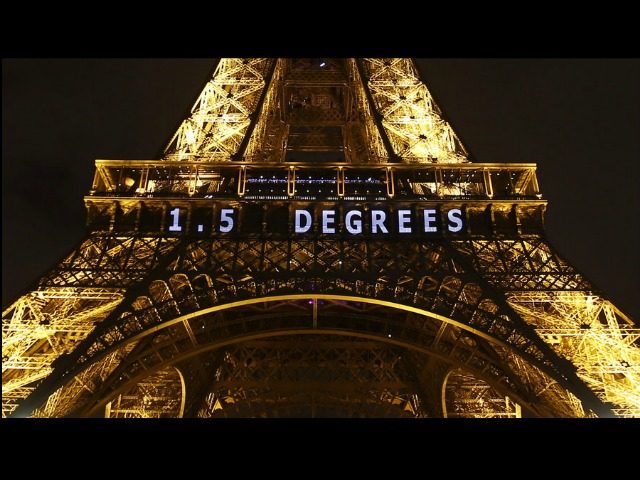In 2015, more than 190 nations signed the Paris Climate Agreement. By doing so, these nations pledged to cut or cap their greenhouse gas emissions—primarily carbon dioxide from burning fossil fuels—to prevent global average temperatures from rising two degrees Celsius above pre-industrial levels.
In truth, the agreement was a fraud from the start—all style, no substance. To stop temperatures from rising by the required amount would necessitate reducing global greenhouse gas emissions by 70 percent by 2050. Furthermore, countries would have to become fully carbon neutral by 2100, a preposterous notion. Yet the plans submitted by the nearly 200 countries would result in less than half the greenhouse gas cuts required to prevent the two-degree temperature rise—and the negotiators knew this all along.
Pretending, for the sake of argument, Earth is threatened by catastrophic anthropogenic climate change, it’s fair to ask: Are the countries involved in the Paris Agreement making the reductions necessary to prevent planetary doom? Are they walking the walk or just talking the talk? The answer seems to be the latter.
For instance, China’s carbon dioxide emissions rose at the fastest rate in seven years during the first quarter of 2018, according to Greenpeace. China, the world’s biggest greenhouse gas emitter, apparently isn’t shy about its emissions record, either. Government data show the country’s carbon dioxide emissions were four percent higher in the first quarter of 2018 than at the same time in 2017. If they remain four percent higher than 2017 throughout the year, it would mark the largest single-year growth in China’s emissions since 2011.
Indeed, China’s emissions have increased steadily since the second quarter of 2016—not long after it agreed to peak CO2 emissions under the Paris agreement.
The International Energy Agency (IEA) has even more bad news for climate alarmists: A recent report reveals global carbon dioxide emissions surged to record levels in 2017. According to IEA, energy-related emissions climbed 1.4 percent in 2017, equivalent to adding 170 million cars on the road. Worldwide demand for energy increased 2.1 percent in 2017, with fossil fuels accounting for approximately 72 percent of the increased use.
Although developing countries in Asia accounted for 66 percent in the global emissions increase, the European Union, which pushed the hardest for steep emissions reduction commitments in Paris, saw its emissions grow as well. Emissions from countries in the European Union increased by 1.5 percent, or 50 million tons, in 2017 alone.
Germany, which set an aggressive near-term goal of cutting greenhouses gas emissions 40 percent below 1990 levels by the year 2020, admitted in early 2017 it would be unable to hit its target. Why? Because in 2015 and 2016, Germany increased its use of coal, a prime emitter of CO2.
In early 2017, France also announced its carbon dioxide emissions grew by 3.6 percent in 2016 and were expected to be higher still in 2017.
In 2017, carbon dioxide emissions increased in several African countries, too, as well as in Brazil, India, Qatar, and Russia. Turkey’s emissions soared by a whopping 13 percent in 2017!
World leaders castigated President Donald Trump when he withdrew the United States from the Paris Climate Agreement, saying it was a bad deal for America. Activists labeled him a climate villain. Yet despite Trump’s decision to pull out of the Paris Agreement and instead prioritize robust economic growth in United States, America experienced the largest year-over-year reduction in carbon emissions—a 0.5 percent decline—of any advanced country. U.S. emissions fell for the third consecutive year without government restrictions on fossil fuel use. On emission reductions, actions should speak louder than words. Trump’s energy policies, which elicit scorn from climate activists and many world leaders, should draw praise.
Climate treaties are mostly about delivering power over the world’s economy to international bureaucrats, not preventing global warming. No one should be surprised by this since Christiana Figueres, then the executive secretary of the Framework Convention on Climate Change, admitted as much at a 2015 climate conference in Brussels: “This is the first time in the history of mankind that we are setting ourselves the task of intentionally … to change the economic development model that has been reigning for at least 150 years, since the industrial revolution.”
Unfortunately, this sinister motive is silenced by the deafening roar surrounding pronouncements of climate doom. In the immortal words of Don McLean, “They would not listen, they’re not, listening still. Perhaps they never will.”
H. Sterling Burnett, Ph.D. (hburnett@heartland.org) is a senior fellow on energy and the environment at The Heartland Institute, a nonpartisan, nonprofit research center headquartered in Arlington Heights, Illinois.

COMMENTS
Please let us know if you're having issues with commenting.